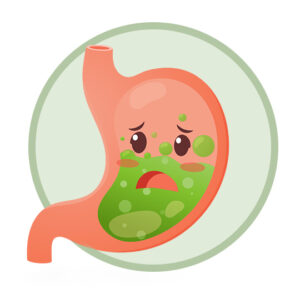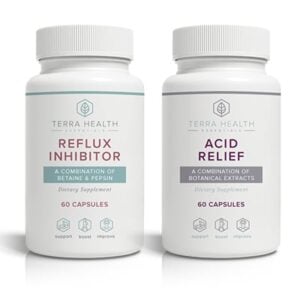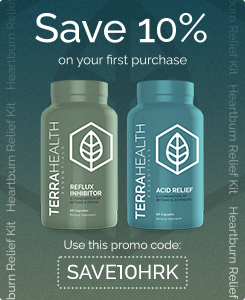It’s easy to get tempted by a greasy takeaway on a Friday night but it’s not so easy to deal with the consequences if you suffer from chronic heartburn! If you’ve experienced the burning sensation in your chest that you get for dessert after indulging in a greasy pizza then you’re definitely in the acid reflux club. The good news is, this is something you can manage once you know how. The right lifestyle changes can have a significant effect on your acid reflux and this is something that’s 100% in your control. You can start right now!
How much of an effect these changes will have on your heartburn is very much dependent on the extent of your symptoms. If you only experience heartburn now and then, it may well be eliminated by adapting your lifestyle. However, if you experience heartburn and reflux more than 3 times a week then you’re likely suffering from something called GERD, and in this case, you’ll need to combine these lifestyle changes with a supplement regime to get complete relief from symptoms.
What is GERD?
 GERD is basically chronic acid reflux which affects 30% of the Western population, and studies show that this figure is rapidly increasing. The main culprit behind GERD is your lower esophageal sphincter muscle, which is a valve that sits between your esophagus and stomach.
GERD is basically chronic acid reflux which affects 30% of the Western population, and studies show that this figure is rapidly increasing. The main culprit behind GERD is your lower esophageal sphincter muscle, which is a valve that sits between your esophagus and stomach.
When your LES is working properly, it closes shut each time food enters your stomach. However, when you have GERD your LES doesn’t close properly, which results in acid going back up into your esophagus and throat causing symptoms such as heartburn, a dry cough, hoarseness, and even chest pain. Your LES is triggered to close by the acid in your stomach, so this problem is actually due to insufficient levels of stomach acid rather than an excess amount.
In order to get control of your GERD and reduce heartburn symptoms, it’s important to make these key lifestyle changes and start on a treatment plan to increase the levels of acid in your stomach and get your LES functioning properly again. Let’s start with what you can do right now to adapt your lifestyle to be more GERD-friendly.
 Diet
Diet
The very first thing you need to do to manage your GERD is to figure out what your “trigger foods” are and limit these as much as possible. It’s also important to try to eat smaller, regular meals during the day rather than large meals as this will make it easier for your digestive system to break down food.
Although trigger foods tend to differ on an individual basis, there are a few common culprits such as coffee, fried and spicy food, fizzy drinks, peppermint, alcohol, chocolate, citrus fruits and juices, and caffeine. These foods can worsen your GERD by causing your LES to relax and let acid leak through.
The best way to figure out what your own problem foods are is to start a food diary to monitor what sets your symptoms off and to what extent. Once you’ve identified these foods, make sure that you get anyone else in your household on board to help you to wean off them as much as you can.
Reduce Pressure On Your Stomach
Studies have shown that stomach pressure can force food and acid back up your esophagus and increase the risk of GERD. If you’re overweight, losing weight around your midsection can help to relieve the pressure on your stomach. Weight loss of even just 2.5kg can help to improve your symptoms. Another way to relieve the pressure is to avoid tight clothing such as belts and elasticated waistbands as these can also push your stomach contents upwards and worsen your reflux.
Late-night snacks also need to be avoided and you should wait about 2 hours at least before you lie down after eating. When you lie down it’s easier for your stomach contents to push against your LES and flow back into the esophagus cause reflux, but by sitting down you’re allowing gravity to help the food move in the right direction.
 Think About How You Sleep
Think About How You Sleep
You spend 7-8 hours of your day sleeping, so it’s important to be aware of how you sleep and how it can affect your reflux throughout the day.
Sleeping with your head elevated is a great way to help to mitigate reflux (thanks again to gravity!) and you can do this by raising the head of your bed by about 6 inches or getting a wedge pillow to sleep on. Don’t have a wedge pillow? Try an extra few pillows to start with and you can always invest in a wedge pillow later.
Quit Smoking
If you’re a smoker I doubt you’ve ever come across a health-related article that hasn’t advised you to quit! But this really is very important if you want to get rid of your heartburn. Smoking can weaken your LES even further and this is the opposite of what you want to happen when you’re already experiencing reflux.
Reduce Stress
Embracing relaxation therapies to relieve stress can reduce the symptoms of GERD and it’s definitely worth trying. How you choose to do so is completely up to you; some people enjoy meditation or mindfulness and other people like to simply sit down with an adult coloring book to get in some relaxation time. The important thing is that you find a way to reduce your stress levels on a consistent basis.
 Natural Solutions for Heartburn Relief
Natural Solutions for Heartburn Relief
In the case of chronic heartburn and GERD, it’s important to combine these healthier lifestyle changes with the right supplements to get your digestive system working properly again in the long term.
Our Heartburn Relief Kit combines our Reflux Inhibitor with our Acid Relief supplement to get your LES functioning correctly to prevent reflux and also provide relief from the symptoms whilst you treat the root cause.
The goal of the Heartburn Relief Kit is to eliminate your acid reflux for good so that you don’t have to maintain a GERD diet for life (and can have a slice of pizza again without worrying about adverse consequences!).
Get 30% off our Heartburn Relief Kit now with this custom code for our readers: lifestyle30 and don’t forget to follow us on Facebook where we can answer any questions you have about your treatment plan.

